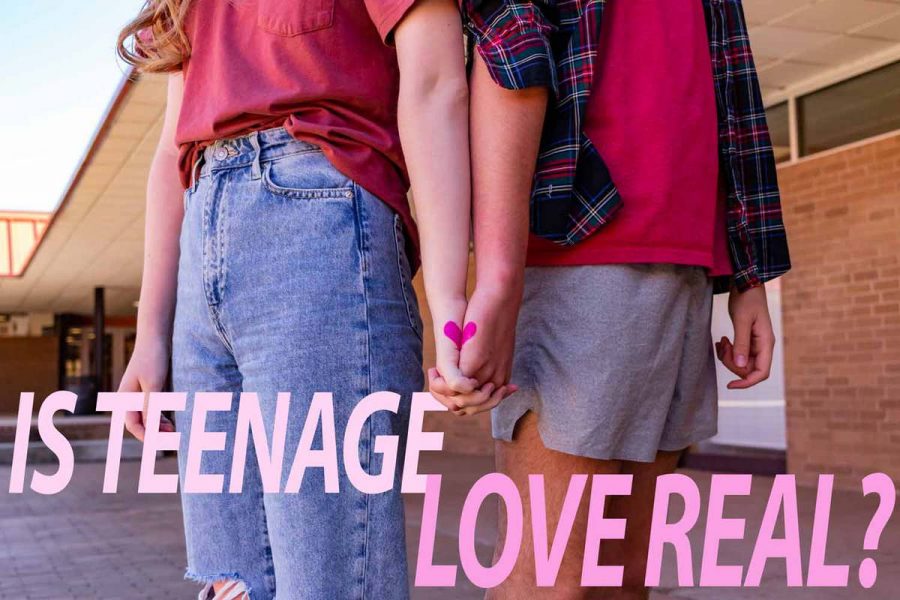Love through teenage eyes
Teens confront their beliefs on young love
Photo by Abby Bunch
anyone who is, or has ever been, in high school has probably either fallen in love or witnessed someone they know do just that. But what about the teens themselves? Do they think the love around them is real?
November 6, 2020
Maybe everyone has watched a movie in their lifetime. Perhaps we’ve all read a book. And anyone who is, or has ever been, in high school has probably either fallen in love or witnessed someone they know do just that. Basically, the only way you haven’t been introduced to the concept of teenagers in love is if you’ve been living under a rock. But what about the teens themselves? Do they think the love around them is real?
Julia Ryden’s life has presented her with opportunities for multiple types of love, and she takes those to heart, trusting herself to know that what she feels is authentic.
“I feel like my definition of love came from what I’ve experienced of it in my lifetime,” junior Julia Ryden said. “[Love is] having a feeling of safety and health and just being able to be with that person and feel completely at home, whether it’s romantically or platonically.”
However, other teens find that their personal experiences give them reason to believe the opposite, that love as a teen isn’t real.
“[My beliefs came from] personal experience. You try to dip your toes in the water of teenage love, and it’s just not actually true love. Anything could happen in a high school relationship,” junior Madison Freeman said. “I just think love is built on trust and communication, and if a relationship doesn’t have trust and communication then it’s not really love. At that time, teenagers don’t know what they’re talking about.”
Freeman and Ryden both use their own backgrounds to determine their thoughts on love, but they have opposing answers. Perhaps there is another source that could give more clarity to whether or not teenage love is real.
“[My beliefs came from] media,” freshman Austin Barwick said. “[Teens are] just too young to know what [love] feels like.”
Barwick isn’t the only one who has turned to media to see how teen love is presented, but it once again culminates in differing opinions.
“[I] think that a lot of teenage love is found in movies, and it’s not portrayed correctly, and how complicated it is, and how kind of scary it is almost to have someone who actually loves you for who you are,” freshman Tyler Unger said.
Of all the people who believe teenage love isn’t real, the general consensus seems to be that teens are simply not mature enough.
“Scientifically, your brain’s not mature until you’re 20 something,” senior Jalena McDermott said. “Teenagers do not know themselves. This is what [being a] teenager is for. You know, to find yourself, discover yourself, all that good stuff, so how on earth are you supposed to love someone else if you don’t even know what you’re thinking?”
McDermott turns to science to back up her answer, and she doesn’t believe that teens are mature enough to truly fall in love, but she also wonders if her upbringing could have played a role in her beliefs.
“Maybe I’m biased. I grew up, my parents were divorced. I’ve never been in a relationship,” McDermott said. “And then [my parents] told me: ‘Wait, don’t get married young,’ because they just fell out of love.”
Ryden, too, acknowledges that her beliefs may be flawed.
“When it comes to teenage love, I would say that goes hand in hand with an immature love, where it’s mostly kind of the honeymoon phase where it’s just pure happiness, but then once actual reality hits and you lose that zing, then you fall out, and I feel like that’s just immature,” Ryden said. “Actual love should be [deeper] than that.”
Ryden does indeed believe that teens can fall in love, which she finds in her personal life, but she also recognizes that many instances of “teen love” are closer to infatuation. All in all, is teen love real?
“There’s no definite answer to that,” senior Connor Corbett said. “Everyone has their own definition of love.”
Whether it comes from media or personal experience, teens draw their differing beliefs from the same sources. Many also find the authenticity of teen love to be conditional. How can we decide if teen love is real when teens themselves are unsure?
















